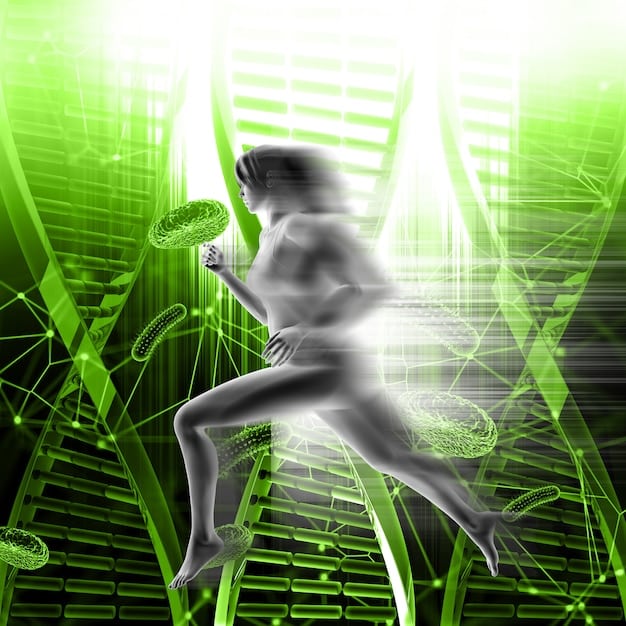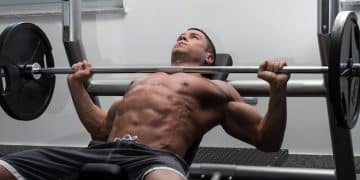Probiotics for Athletes: Gut Health, Nutrient Absorption & Performance

Probiotics for athletes are gaining recognition for their potential to significantly improve gut health, optimize nutrient absorption, and ultimately enhance athletic performance by supporting the intricate connection between a balanced microbiome and physical prowess.
For athletes, every edge counts. From rigorous training regimens to meticulous nutritional planning, the pursuit of peak performance is an ongoing journey. What many are now discovering, however, is a powerful ally located right within their own bodies: the gut. The intricate ecosystem of bacteria residing in our digestive tracts, often referred to as the gut microbiome, plays a far more critical role in overall health and athletic capability than previously understood. This exploration delves into how Probiotics for Athletes: Improve Gut Health and Nutrient Absorption for Enhanced Performance, offering a comprehensive look at the science, benefits, and practical considerations for integrating these beneficial microorganisms into an athlete’s routine.
The Athlete’s Gut: More Than Just Digestion
The gut is often called “the second brain” due to its extensive neural network, but for athletes, it might be better termed the “first engine.” Beyond simply digesting food, the gut microbiome impacts metabolism, immune function, inflammation, and even mood – all factors crucial for athletic success. During intense training, athletes expose their bodies to significant physical and physiological stress, which can disrupt the delicate balance of gut bacteria, leading to issues like “leaky gut,” gastrointestinal distress, and compromised immune responses. Understanding this intricate relationship is the first step toward harnessing the power of probiotics.
Studies have increasingly highlighted how the demands of high-intensity exercise can alter microbial diversity and function. Professional athletes, marathon runners, and bodybuilders frequently report digestive discomfort. This isn’t merely an inconvenience; it can directly impair training consistency, performance on competition day, and recovery. Addressing these issues systematically, rather than reactively, creates a more robust foundation for the athlete’s body.
Impact of Intense Training on Gut Health
The physiological stress of exercise can divert blood flow from the gastrointestinal tract to working muscles, leading to transient ischemia and reduced integrity of the gut lining. This can make the gut more permeable, allowing undigested food particles, toxins, and bacteria to escape into the bloodstream, triggering systemic inflammation. This phenomenon is often referred to as exercise-induced gut damage or “leaky gut” syndrome.
- Increased Gut Permeability: Exercise, especially prolonged or high-intensity efforts, can compromise the tight junctions between intestinal cells.
- Reduced Microbial Diversity: Chronic stress and altered dietary patterns of athletes can lead to an imbalance, reducing the variety of beneficial bacteria.
- Gastrointestinal Symptoms: Athletes frequently report bloating, nausea, diarrhea, and cramps, particularly during or after strenuous events.
Furthermore, the repeated hits of training, coupled with potential dietary imbalances or the use of certain medications, can perpetuate a cycle of gut dysbiosis. This imbalance, where harmful bacteria outweigh beneficial ones, can undermine an athlete’s immune system, making them more susceptible to infections and illnesses, which in turn impacts training continuity. The constant battle against inflammation, often exacerbated by a compromised gut, consumes valuable energy that could otherwise be dedicated to recovery and adaptation.
How Probiotics Enhance Nutrient Absorption
One of the most compelling reasons for athletes to consider probiotics is their pivotal role in nutrient absorption. A healthy gut microbiome actively participates in breaking down complex carbohydrates, synthesizing certain vitamins, and facilitating the uptake of essential minerals. When this system is optimized, the body can more efficiently utilize the fuel it receives, directly translating into better performance and recovery.
For athletes following strict dietary plans, even the most nutrient-dense foods can be ineffective if the gut isn’t functioning optimally. Probiotics contribute to a healthier intestinal environment, where beneficial bacteria help to predigest food components, release sequestered nutrients, and maintain the integrity of the gut lining, minimizing the loss of valuable micronutrients. This enhanced bioavailability means that an athlete gets more “bang for their buck” from their carefully chosen diet.
Mechanisms of Probiotic Action on Nutrient Uptake
The mechanisms by which probiotics enhance nutrient assimilation are multifaceted and complex. They involve direct interactions with food molecules, enzymatic activity, and indirect effects on the intestinal environment, all contributing to a more efficient digestive process. Many probiotic strains produce short-chain fatty acids (SCFAs), such as butyrate, propionate, and acetate, which serve as crucial energy sources for gut cells and have systemic anti-inflammatory effects.
- Enzymatic Assistance: Certain probiotic strains produce enzymes that further break down food components, such as lactose in dairy or complex plant fibers.
- Vitamin Synthesis: Specific bacteria within the gut can synthesize B vitamins (like B12, folate) and vitamin K, which are vital for energy metabolism and blood clotting.
- Mineral Bioavailability: A balanced gut pH, maintained by probiotics, can improve the solubility and absorption of minerals like calcium, magnesium, and iron – critical for bone health, muscle function, and oxygen transport.
Moreover, a healthy gut barrier, reinforced by probiotics, means that nutrients are absorbed efficiently across the intestinal wall into the bloodstream, rather than being impeded by inflammation or a compromised lining. This translates into more available glucose for energy, more amino acids for muscle repair, and more micronutrients for cellular processes, all directly supporting an athlete’s metabolic demands. Ensuring optimal absorption isn’t just about avoiding deficiencies; it’s about maximizing functional capacity.
Probiotics and Immune Function in Athletes
The link between the gut and the immune system is profound. Approximately 70-80% of the body’s immune cells reside in the gut-associated lymphoid tissue (GALT). During intense training, athletes often experience periods of immune suppression, making them more susceptible to upper respiratory tract infections (URTIs) and other illnesses. Probiotics can play a significant role in modulating and strengthening this immune response, helping athletes stay healthy and consistent in their training.
By fostering a balanced gut microbiome, probiotics help to reinforce the gut barrier, reducing the translocation of pathogens and toxins into the bloodstream, which would otherwise trigger an immune response. They also directly interact with immune cells, influencing the production of anti-inflammatory compounds and enhancing the body’s ability to ward off infections. This protective effect is invaluable for athletes, for whom illness can mean missed training sessions, reduced performance, and prolonged recovery times.
Strengthening Immune Defenses with Probiotics
Probiotics enhance immune function through several mechanisms, including direct competition with pathogens, modulation of cytokine production, and reinforcement of the gut barrier. Certain strains are particularly effective in supporting mucosal immunity, the body’s first line of defense against inhaled or ingested pathogens.
- Barrier Reinforcement: Probiotics help maintain the integrity of the intestinal lining, preventing pathogens and allergens from entering the bloodstream and triggering systemic immune reactions.
- Pathogen Exclusion: Beneficial bacteria compete with harmful microbes for nutrients and adhesion sites, effectively “crowding out” undesirable species.
- Immunomodulation: Probiotics can influence the activity of immune cells within the gut, promoting a balanced inflammatory response and enhancing the production of antibodies.
For the elite athlete, maintaining an unwavering immune system is non-negotiable. Overtraining syndrome, often exacerbated by chronic inflammation and immune dysregulation, can derail an entire season. Integrating probiotics can provide a crucial line of defense, reducing the incidence and severity of common illnesses that frequently plague athletes during periods of high stress. This proactive approach to health means more uninterrupted training, leading to incremental gains and peak performance when it matters most.
Reducing Exercise-Induced Gastrointestinal Issues
Gastrointestinal problems are a common complaint among athletes, especially those engaged in endurance sports. Symptoms like nausea, cramps, bloating, and diarrhea can severely impact performance during competition and hinder training consistency. These issues are often a direct result of the physiological stress of exercise on the digestive system, including altered blood flow, increased gut permeability, and mechanical agitation.
Probiotics offer a promising strategy for mitigating these exercise-induced GI symptoms. By restoring and maintaining a healthy gut microbiome, they can help to regulate gut motility, reduce inflammation, and enhance the barrier function of the intestinal lining. This results in a more resilient and less reactive digestive system, allowing athletes to train and compete with greater comfort and fewer disruptions.

Probiotic Strategies for GI Relief
Specific probiotic strains have been studied for their ability to alleviate common exercise-induced GI symptoms. The efficacy can depend on the strain, dosage, and duration of supplementation, but the overall trend suggests a positive impact on digestive comfort for many athletes.
- Regulation of Gut Motility: Probiotics can help normalize the speed at which food passes through the digestive tract, reducing issues like diarrhea or constipation.
- Decreased Inflammation: By producing anti-inflammatory compounds and strengthening the gut barrier, probiotics can reduce localized inflammation within the gut, which often contributes to discomfort.
- Improved Gut-Brain Axis: A healthy gut microbiome communicates with the brain, influencing pain perception and overall gut sensation, potentially reducing the perception of discomfort.
For athletes who have previously struggled with GI distress during crucial training blocks or competitions, the integration of targeted probiotic therapy can be a game-changer. It shifts the focus from managing symptoms to addressing the root cause, leading to more consistent performance and greater confidence. This is not just about comfort; it’s about optimizing physiological processes so that energy can be directed towards muscular output and strategic thinking, rather than being diverted to coping with digestive upset.
Choosing the Right Probiotics for Athletes
With a vast array of probiotic products on the market, choosing the right one can be daunting. Not all probiotics are created equal, and specific strains offer different benefits. For athletes, the focus should be on strains that have demonstrated efficacy in promoting gut health, enhancing nutrient absorption, supporting immune function, and reducing exercise-induced GI symptoms. Research and consultation are key.
When selecting a probiotic, consider factors such as strain specificity, colony-forming units (CFUs), delivery method, and third-party testing. Labels should provide clear information about the specific bacterial strains (e.g., Lactobacillus plantarum, Bifidobacterium lactis), rather than just generic family names. Higher CFU counts generally indicate a greater number of live bacteria, though the optimal dose can vary by strain and desired effect.
Key Considerations for Probiotic Selection
The diversity of probiotic strains, each with unique properties, underlines the importance of informed choices. What works for one athlete might not be ideal for another, emphasizing a personalized approach.
- Strain Specificity: Look for products containing strains extensively researched for athletic benefits, such as those that support immune health or mitigate exercise-induced gut issues. Examples include Lactobacillus plantarum, Bifidobacterium breve, and Lactobacillus fermentum.
- Formulation and Potency: Check the CFU count, ensuring it is a therapeutically relevant dose (often billions). Also, consider the delivery system – some encapsulated forms protect bacteria from stomach acid.
- Quality and Purity: Opt for reputable brands that provide third-party testing for purity, potency, and absence of contaminants. This is crucial as the supplement industry can have varying standards.
Beyond isolated supplements, athletes should also consider incorporating probiotic-rich foods into their daily diet. Fermented foods like yogurt, kefir, sauerkraut, kimchi, and kombucha naturally contain a variety of beneficial bacteria. While these foods may not provide the concentrated, targeted strains found in some supplements, they contribute to overall microbial diversity and offer additional nutritional benefits. A holistic approach that combines dietary intake with targeted supplementation, when appropriate, often yields the best results for long-term gut health and athletic performance. Always consult with a sports nutritionist or healthcare professional before making significant changes to your supplement regimen.
Integrating Probiotics into an Athlete’s Routine
Successfully integrating probiotics into an athlete’s routine requires a thoughtful approach, considering timing, consistency, and synergy with other nutritional strategies. Probiotics are not a quick fix but rather an aspect of long-term health optimization. Their benefits are often cumulative, becoming more pronounced with consistent use over weeks and months. Establishing a regular intake schedule is paramount.
The timing of probiotic intake can be debated, but generally, taking them on an empty stomach a few minutes before a meal or before bedtime is often recommended to minimize exposure to digestive acids. However, some strains are more resilient and can be taken with food. Consistency, regardless of timing, is more important than specific timing in most cases. Athletes should consider the demands of their training cycle, integrating probiotics to support periods of high stress, travel, or intense competition.
Practical Tips for Probiotic Integration
Effective integration is about more than just taking a pill; it’s about creating a sustainable practice that complements an athlete’s existing lifestyle and training demands. Customization based on individual needs and responses is key.
- Daily Consistency: Probiotics work best when taken regularly. Make it a part of your daily supplement regimen, similar to a multivitamin.
- Pair with Prebiotics: Prebiotics are non-digestible fibers that act as “food” for beneficial bacteria. Combining probiotics with prebiotics (found in foods like onions, garlic, bananas, oats) can enhance their efficacy.
- Listen to Your Body: Pay attention to how your body responds to probiotic supplementation. If you experience initial discomfort, it might be a sign of microflora adjustment, or you may need to adjust the strain or dosage.
Furthermore, the long-term benefits of probiotics extend beyond immediate performance gains. By fostering a healthier gut, athletes can improve overall well-being, enhancing mood, reducing fatigue, and even improving sleep quality – all indirect but significant contributors to peak athletic functioning. It’s about building a robust internal environment that can withstand the rigors of athletic pursuits, ensuring sustained health and performance throughout a career. This holistic perspective underscores the profound and far-reaching impact of a well-supported gut microbiome on the entire athletic system.

Emerging Research and Future of Probiotics in Sports
The field of gut microbiome research, particularly its application in sports science, is rapidly evolving. Emerging studies are continually uncovering new insights into specific probiotic strains, their mechanisms of action, and their nuanced effects on athletic performance markers. This dynamic area promises even more tailored and effective probiotic interventions for athletes in the years to come.
Advances in metagenomics and metabolomics are allowing researchers to map the highly personalized nature of the gut microbiome, leading to a future where probiotic supplementation might be precisely formulated based on an individual athlete’s unique microbial fingerprint and specific performance goals. The focus is shifting from general gut health to highly targeted microbial interventions, optimizing everything from muscle recovery to mental resilience.
Frontiers in Probiotic Research
The scientific community is increasingly looking beyond general health benefits, meticulously dissecting how different microbial compositions and specific strains influence very particular athletic outcomes.
- Personalized Probiotics: Future developments may involve testing an athlete’s unique microbiome to recommend highly specific probiotic strains for their individual needs.
- Mental Performance Link: Research is exploring the gut-brain axis more deeply, investigating how probiotics might influence an athlete’s focus, stress response, and mental fortitude during competition.
- Recovery and Injury Prevention: New studies are examining how distinct probiotic cultures might accelerate muscle repair, reduce oxidative stress, and assist in preventing injuries by optimizing inflammatory responses.
The integration of artificial intelligence and machine learning into microbiome analysis is expected to accelerate these discoveries, allowing for the identification of complex patterns and predictive biomarkers. This could lead to probiotic regimes that are not only personalized but also dynamic, adapting to an athlete’s training phases, dietary changes, and competitive schedules. The future of athletic supplementation looks increasingly microbial, with probiotics at the forefront of optimizing internal physiological landscapes for external peak performance. This continuous scientific exploration ensures that the advice and resources available to athletes will become even more precise and impactful.
| Key Benefit | Brief Description |
|---|---|
| 💪 Enhanced Nutrient Absorption | Optimizes digestion and uptake of vital vitamins and minerals, crucial for energy and muscle function. |
| 🛡️ Stronger Immune Function | Reduces risk of infections during intense training, keeping athletes healthier and more consistent. |
| 🏃♀️ Reduced GI Issues | Alleviates symptoms like bloating and cramps often experienced by athletes, improving comfort and focus. |
| 🧠 Improved Recovery & Resilience | Supports faster recovery and reduces inflammation, contributing to overall physical and mental resilience. |
FAQ: Probiotics for Athletes
▼
For athletes, strains like Lactobacillus plantarum, Bifidobacterium breve, and Lactobacillus fermentum have shown promise. These strains often assist with reducing exercise-induced gut issues, enhancing immune function, and potentially improving nutrient absorption, crucial for high-performance demands and consistent training. Always look for products with specific strain names.
▼
The time frame for noticing benefits can vary widely depending on the individual, the probiotic strain, and the consistency of use. Some athletes might experience improvements in digestion within a few days or weeks, while immune system benefits or chronic issue resolution may take several weeks to months of consistent supplementation to become evident.
▼
Yes, several studies indicate that certain probiotic strains can help strengthen the intestinal barrier, effectively reducing exercise-induced gut permeability or “leaky gut.” By supporting the tight junctions between intestinal cells and fostering a balanced microbiome, probiotics can minimize the inflammatory response often triggered by a compromised gut lining during strenuous activity.
▼
Most athletes tolerate probiotics well, with minimal side effects. Some individuals may experience mild digestive discomfort, such as bloating or gas, when first starting supplementation as their microbiome adjusts. These symptoms usually subside within a few days. It’s advisable to start with a lower dose and gradually increase it, or consult a healthcare professional if symptoms persist.
▼
Combining prebiotics with probiotics, often referred to as synbiotics, can enhance the effectiveness of probiotic supplementation. Prebiotics are non-digestible fibers that act as food for beneficial gut bacteria, promoting their growth and activity. Incorporating prebiotic-rich foods like oats, bananas, garlic, and onions into your diet can support a thriving gut microbiome alongside probiotic intake.
Conclusion
The journey to peak athletic performance is multifaceted, encompassing rigorous training, meticulous nutrition, and robust recovery strategies. Increasingly, the scientific community and elite athletes alike are realizing that the gut, with its complex microbial ecosystem, is a foundational pillar supporting all these aspects. Probiotics, by fostering a healthy and balanced gut microbiome, offer a powerful tool to enhance nutrient absorption, bolster immune function, mitigate exercise-induced gastrointestinal distress, and ultimately contribute to superior athletic outcomes. This isn’t merely about treating symptoms; it’s about optimizing an athlete’s internal environment for sustained health, resilience, and performance. As research continues to uncover the intricate connections between gut health and athletic prowess, integrating targeted probiotic strategies into an athlete’s regimen promises to be an increasingly non-negotiable step toward achieving and maintaining their competitive edge. The future of sports nutrition is undeniably moving towards a more personalized, gut-centric approach, where these beneficial microorganisms play a central role in unlocking an athlete’s full potential.





